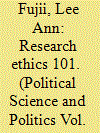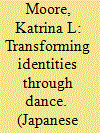| Srl | Item |
| 1 |
ID:
116472


|
|
|
|
|
| Publication |
2012.
|
| Summary/Abstract |
The emphasis in political science on procedural ethics has led to a neglect of how researchers should consider and treat study participants, from design to publication stage. This article corrects this oversight and calls for a sustained discussion of research ethics across the discipline. The article's core argument is twofold: that ethics should matter to everyone, not just those who spend extended time in the field; and that ethics is an ongoing responsibility, not a discrete task to be checked off a "to do" list. Ethics matter in all types of political science research because most political science involves "human subjects." Producers and consumers of political science research need to contemplate the ambiguous and oftentimes uncomfortable dimensions of research ethics, lest we create a discipline that is "nonethical," or worse, unethical.
|
|
|
|
|
|
|
|
|
|
|
|
|
|
|
|
| 2 |
ID:
126073


|
|
|
|
|
| Publication |
2013.
|
| Summary/Abstract |
The advisory opinion rendered by the Seabed Disputes Chamber of the International Tribunal for the Law of the Sea in the Responsibilities and Obligations of the Sponsoring States case clarified some important issues concerning the deep seabed mining regime of the Convention on the Law of the Sea. Particularly, the obligation to ensure undertaken by the sponsoring State is an obligation of "due diligence"; the "necessary and appropriate measures" may also be used to clarify the due diligence obligation; the conditions for the liability of the sponsoring State to arise are defined; and the contractor and the sponsoring State do not bear joint and several liability. Nevertheless, some relevant issues need further clarification.
|
|
|
|
|
|
|
|
|
|
|
|
|
|
|
|
| 3 |
ID:
082039


|
|
|
|
|
| Publication |
2008.
|
| Summary/Abstract |
More than eighty years since Chief Deskaheh petitioned the
League of Nations for Haudenosaunee self-determination, it is
becoming clearer that the existing rights discourse can take indigenous
peoples only so far. States and global/regional forums
have framed self-determination rights that deemphasize the responsibilities
and relationships that indigenous peoples have
with their families and the natural world (homelands, plant life,
animal life, etc.) that are critical for the health and well-being of
future generations. What is needed is a more holistic and dynamic
approach to regenerating indigenous nations, and I propose
the concept of sustainable self-determination as a benchmark
for future indigenous political mobilization. Utilizing case studies
of indigenous community regeneration such as the Native
Federation of Madre de Dios (FENAMAD) in Peru and the
White Earth Land Recovery Project (WELRP) on Turtle Island
as well as analyzing the existing research on rights, political
mobilization, and ecosystems, this article identifies alternatives
to the existing rights discourse that can facilitate a meaningful
and sustainable self-determination process for indigenous peoples
around the world. Overall, findings from this research
offer theoretical and applied understandings for regenerating
indigenous nationhood and restoring sustainable relationships
on indigenous homelands
|
|
|
|
|
|
|
|
|
|
|
|
|
|
|
|
| 4 |
ID:
124531


|
|
|
|
|
| Publication |
2013.
|
| Summary/Abstract |
While the performance of its celebrated actors is often in the limelight, an equally important, but often unremarked, element of the Noh world is the many amateur performers who engage in the practice as a leisure activity. This article explores the shifts in identity that women say occur through Noh practice. I examine the 'states of being' that arise through these performances, and explore how women say Noh practice contributes to their life course development. Drawing on ethnographic research, I examine how the process of learning Noh intertwines with the everyday lives of women amateurs, and how the rigours and pleasures of learning Noh take on a particular significance as women grow older.
|
|
|
|
|
|
|
|
|
|
|
|
|
|
|
|
| 5 |
ID:
102564


|
|
|
|
|
| Publication |
2011.
|
| Summary/Abstract |
There is a theoretical disagreement between the classical normative positive view on decentralisation, which states that the fragmentation of power shifts policy more closely into line with citizens' preferences, and a more recent critical view that states that decentralisation blurs attribution of responsibility. This disagreement can only be resolved by refining the understanding of specific institutional designs. The theoretical claim in this article is that the relation between multilevel governance and clarity of responsibilities is contingent upon the type of decentralisation in place. To test this proposition, individual data from an asymmetrically decentralised system - the Spanish State of Autonomies - are used. Results show that the relationship between decentralisation and clarity of responsibility has a u-shape. Responsibility attribution is clearer in regions with high and low levels of decentralisation, where one level of government clearly predominates over the other, than in regions with a more intertwined distribution of powers.
|
|
|
|
|
|
|
|
|
|
|
|
|
|
|
|